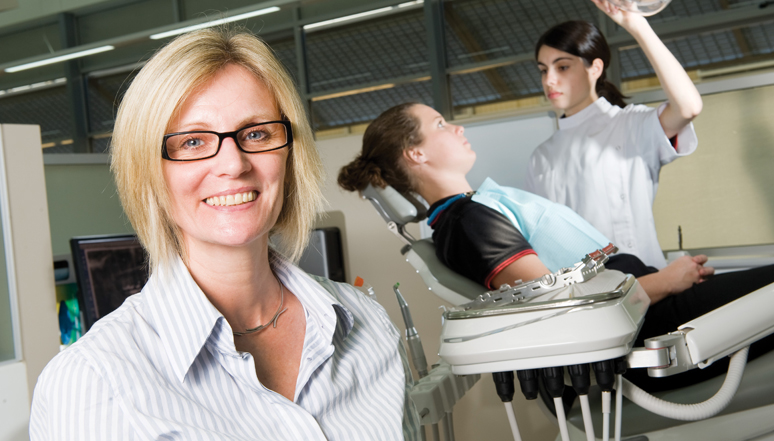Researcher Highlights
A Forensic Look at Dentistry
Associate Professor Jane Taylor
Visiting the dentist can be a daunting experience, but for Associate Professor Jane Taylor OAM, our teeth can provide critical information about us - you just need to know what you're looking for.

As part of her role with the Australian Society of Forensic Odontology, Professor Jane Taylor has played a crucial function in victim identification in the 2002 Bali Bombing, the 2004 Boxing Day Tsunami in Thailand and the Victorian Bushfires of 2009.
Jane admits that the emotional toll is significant when working on multi-death disasters but acknowledges the positive and necessary role that her victim identification skills play.
"It is very challenging to wake up in the morning and know that I'm going to have to meet a lot of deceased people, but we do what is a necessary and helpful part of the process for those people and their family members," Jane discloses.
In recognition of her services, Jane was awarded a medal of the Order of Australia in 2003, an Overseas Humanitarian Service Award in 2007 and an Australian Police Operations Medal in 2009.
In the interest of justice
The practice of using teeth as a method of identification is not new. In fact - one of the earliest known examples of forensic odontology involved Agrippina, the mother of Emperor Nero who ordered the death of her rival Lollia Paulina. Agrippina wasn't convinced that Lollia Paulina was actually dead until she noticed her distinctive black front tooth.
Today, however, forensic odontology is a far more rigorous and scientific process in which Jane is a world-leading expert.
"The bulk of our work involves identifying people that are deceased - whether that be in single issue circumstances, like a car accidents, or in disaster situations where many people lose their lives," Jane remarks.
"We're also able to age people by their teeth."
Jane also examines and identifies bite marks, from both humans and animals, given they can be present in both civil and criminal cases.
"Sadly, we see quite a few bite marks related to child abuse," she discloses.
"In some situations it is possible to identify the teeth that made the bite but it is a complex investigative area."
Going digital
Excited about the future directions of forensic dentistry research, Jane predicts new technologies will advance existing and emerging methods of victim identification and ageing.
"For example, CT machines may allow us to obtain enough information about a patient without having to do an official post-mortem," she suggests.
Clinical beginnings
Starting her career as a practicing dentist, Jane decided to pursue a long-held interest in forensic dentistry. She commenced working at the Dental School and Forensic Odontology Unit at the University of Adelaide in 1987, and moved to the University of Newcastle in 2004 to be part of the team that established the Bachelor of Oral Health program.
In conjunction with Central Coast Medicare Local, Jane was a part of the "Senior Smiles" program, initiated in 2014, which delivered oral hygiene to people in residential aged-care facilities.
The pilot study placed a dental hygienist into an aged-care facility who then provided dental examinations, oral hygiene care plans and oral health education to residents and carers.
"We know that when people get admitted to a nursing home that their oral health often rapidly deteriorates and it is well known that poor oral health is linked with decreasing general wellbeing and overall quality of life," Jane explains.
"Senior Smiles aimed at delivering oral healthcare to residents during the study period to assess whether this made an improvement in the health levels in their mouths, and yes it does".
Jane suggests that the resoundingly positive results of Senior Smiles show how valuable and critical access to dental healthcare is for those living in aged-care facilities.
"Our response now is to become advocates for nursing homes to increase the level of access of oral health and hygiene to their residents," Jane advises.
"Fantastically we've had a couple of local nursing homes either employing a dental hygienist or contemplating doing so in the future".
It is hoped that the positive results of the Senor Smiles program will lead to policy changes that instigates the access of dental hygienists in all nursing homes and aged-care facilities.
Meaningful and purposeful
Jane suggests that an area where forensic odontology will continue to play a crucial role is in the identification of refugees who come to Australia.
"A lot of people who are forced to flee their countries don't think to pick up their birth certificates so forensic dentistry can play an important role in ageing and identifying refugees," Jane says."With the advancement of new technologies, the practical applications for forensic dentistry are enormo
The University of Newcastle acknowledges the traditional custodians of the lands within our footprint areas: Awabakal, Darkinjung, Biripai, Worimi, Wonnarua, and Eora Nations. We also pay respect to the wisdom of our Elders past and present.
